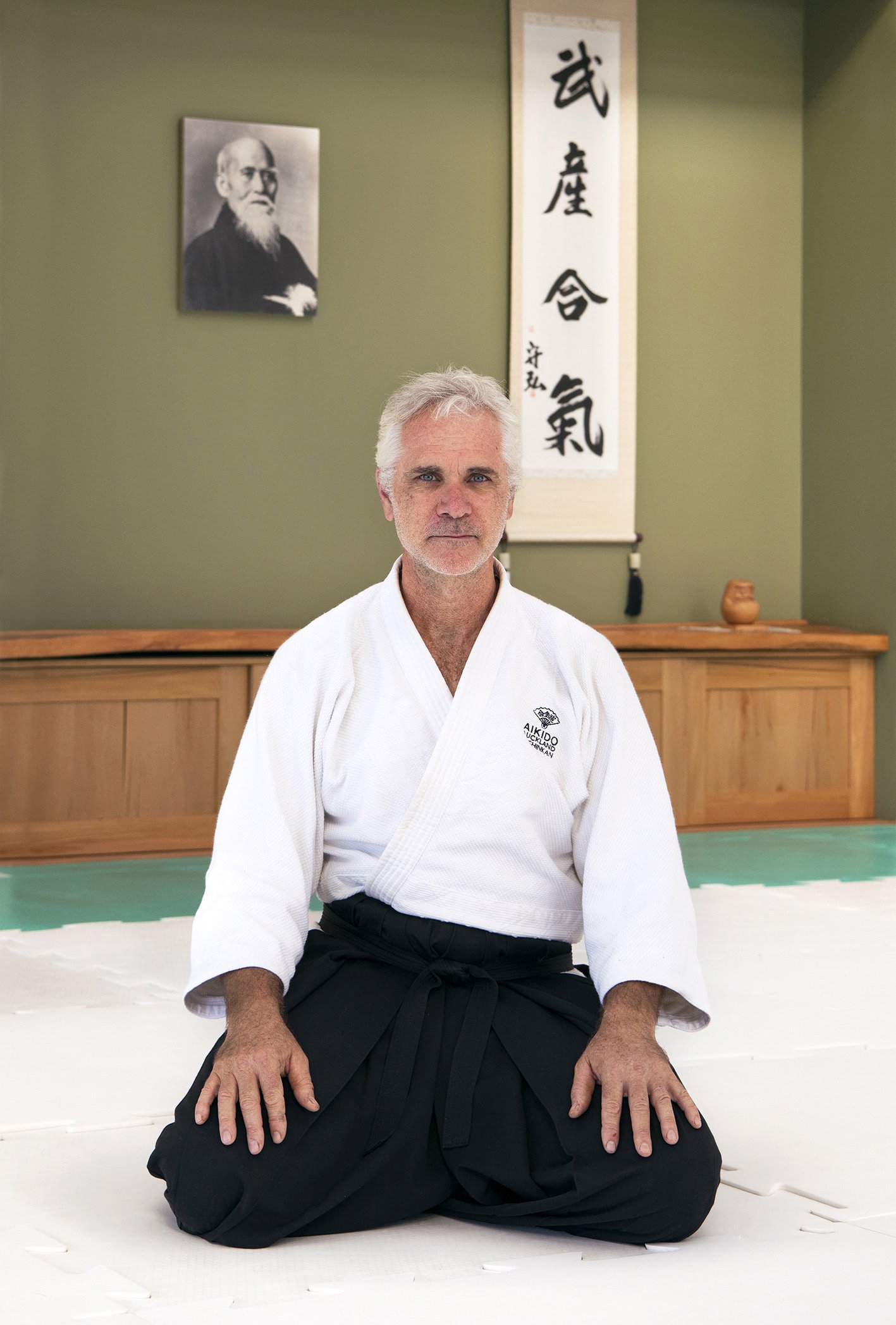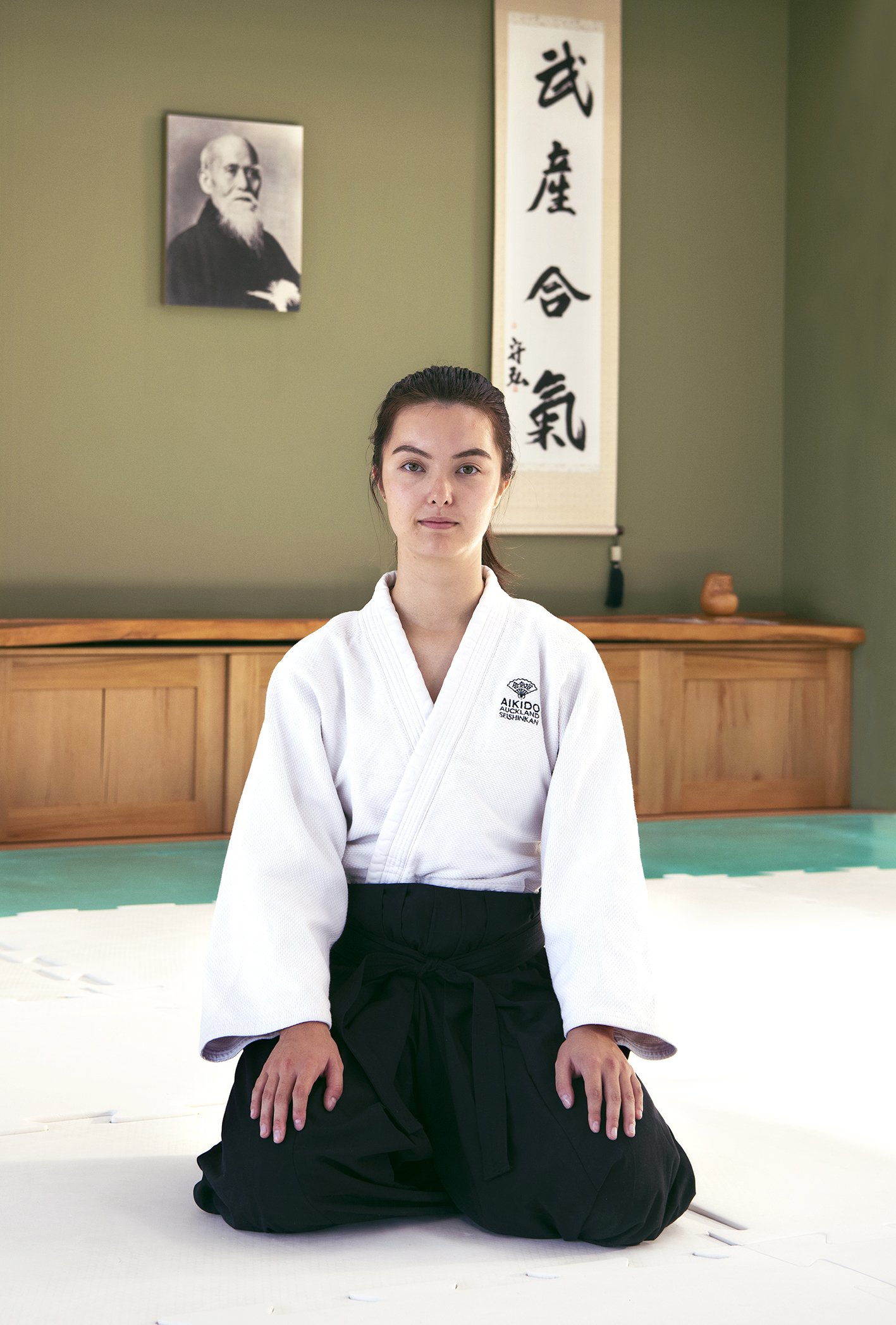
Our Instructors
Alan Roberts
Chief Instructor
6th dan Aikikai
Roberts studied with Morihiro Saito in Iwama from 1988 to 1994. This experience included a year living on the mats of the dojo as an uchideshi. He is the only Aikido teacher in Aotearoa New Zealand to have served such an apprenticeship.
Roberts began teaching Aikido in Auckland in 1994. He is the Technical Director of Aikido Aotearoa New Zealand and teaches workshops throughout Aotearoa New Zealand and abroad.
Roberts is committed to continuing the legacy of Iwama Aikido, particularly emphasising Aikido’s sword and staff in unity with unarmed practice. He is grateful for the personal growth and friendships Aikido has brought him and hopes, in turn, to provide similar benefits to his students.
Roberts has supplemented his practice of Aikido with study in other martial arts; most prominently Cheng Hsin, Brazilian Jiujitsu and Takamura ha Shindō Yōshin Ryū. Professionally, Roberts is a practitioner of Hellerwork Structural Integration. This knowledge and experience provide breadth and depth to his teaching of Aikido.
Ian Wills
Instructor
4th dan Aikikai
Wills began his Aikido training in 1986, and graded for shodan with Morihiro Saito in Iwama in 1988. He values how the continuous learning that is core to practising Aikido informs his training, enabling discoveries that are driven by curious and playful approaches. He hopes to impart these values to students; to help them foster their own sense of curiosity and dedication to their training.
Wills is interested in the reciprocal relationships between Aikido and general life. For example, the interpersonal and leadership skills that are developed via parenting and professional work environments are readily transferable to teaching and practicing Aikido. Equally, being a student of Aikido imbues a deep understanding of the principles of kaizen (change for the better) which connects with the continuous improvements that are required in developing a successful business.
Will’s interest in gardening, with its key attributes of curiosity and observation, compliments his Aikido practice. Although he has experience with other martial arts, Wills is now dedicated to Aikido - with its focus on developing mind and body - as a lifelong pursuit.
Malcolm Dale
Instructor
4th dan Aikikai
Dale began his Aikido training in 1999, and graded for shodan in 2002. He is drawn to Aikido not only as a form of exercise that incorporates mind and body, but also for its endless scope for further development and improvement. Dale values how Aikido’s non-competitive structure builds a focused and dedicated approach to one’s training.
As an instructor, Dale aims to advise students on fundamental questions concerning poise, posture and approach which in turn determine the effectiveness of all kinds of movement. He is interested in how learning and practising Aikido techniques have principles that go beyond training itself.
Dale’s varied career-from a young patent attorney to an old labourer-has provided time and opportunities to reflect on not only how physical work can be carried out in ways that are bodily sustainable, but also on the connections between Aikido concepts and everyday life.
George Cornwell
Instructor
3rd dan Aikikai
Cornwell began his Aikido training in 1997, and, after a break, graded for shodan in 2013. He finds practising Aikido stimulating for both mind and body, and is appreciative of how his training complements many aspects of his life.
Cornwell connects his Aikido training and the dōjō’s core values (clarity, commitment, courage, excellence, integrity, respect, responsibility) with his professional life. What he learns via Aikido influences how he is as an employee and colleague. As an instructor and a senior student he hopes to steer people in the direction of these values.
Cornwell is interested in how the skills learned through Aikido are not dependent on physical strength alone. He aims to imbue students with a sense of physical confidence, which not only serves their Aikido development but other areas of their lives too. Cornwell values how people from diverse backgrounds are able to come together, and through a common interest create a supportive atmosphere for Aikido training. He wants to impart this sense of belonging to students.
Reiko Yoshida-Wildash
Instructor
2nd dan Aikikai
Yoshida-Wildash began her Aikido training in 2004 in the children’s classes, and graded for shodan in 2017. As a kinaesthetic learner, she values how ability within Aikido is based on constant physical practise and experimentation. For Yoshida-Wildash, Aikido teaches her how to address confrontational scenarios within a safe space where she can test and trial what works best in a technique.
As an instructor, Yoshida-Wildash aims to help students see the parallels between their Aikido training and their lives outside of the dōjō. She is interested in how training provides unique opportunities to experiment with different methods of dealing with confrontation. She believes that practising Aikido develops one’s adaptability and helps to avoid mental freeze when a situation evolves in unexpected ways.
As an aspiring scientist, Yoshida-Wildash sees a relationship to the holistic problem solving that occurs in Aikido training. Within her teaching, she hopes to help students develop their own sense of problem solving so that improvements can be made.
James Cassels-Brown
Children’s Instructor
2nd dan Aikikai
Cassels-Brown began his Aikido training in 2015, and graded for shodan in 2020. He is drawn to how Aikido involves both mental and physical engagement, which provides opportunities for continued learning and ongoing improvement. Cassels-Brown values how Aikido helps him to develop a calmer mindset which influences how he manages stressful situations.
Cassels-Brown has a deep commitment to his training and is always seeking to make the most of learning opportunities. He is interested in how the process of learning requires self-discipline, openness and the ability to have fun. As an instructor he aims to impart this same sense of passion, discipline and enjoyment to students. He also believes that a focused approach to training provides solid ground for leading an all-round healthy life.
Cassels-Brown compliments his Aikido practice through additional martial arts training; he is also a student of Judo and Hapkido. By broadening the scope of his training he learns how to work with and use the body efficiently. He brings this learning back to his Aikido training and teaching.





